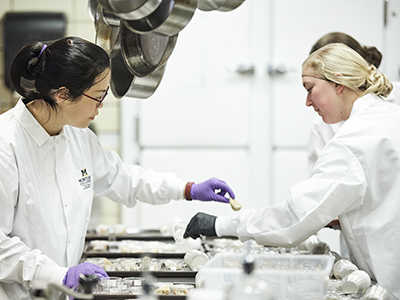Building Indigenous food entrepreneurship with Senegalese smallholder women farmers
Background
In 2019, master's student Edwin Allan, Food Product Development Lab (FPDL) director Dr. Wan-Yuan Kuo, and several undergraduate researchers founded the PATH (Promoting Agricultural Transformation Holistically)* program to address the problem of postharvest crop losses, malnutrition, food insecurity, and poverty in West Africa. The initiative began with a collaborative effort between the FPDL and Bountifield International to empower smallholder women farmers in Senegal's Kaffrine region. The goal was to create a value-added food product, fostering economic growth and enhancing community nutrition. Edwin and Dr. Kuo embarked on an exploratory trip to Senegal in 2019, during which they conducted surveys and engaged in focus group discussions with the farmers to lay the foundation for their project.
Bonbon Bouye
From their field research, PATH members learned that cowpea and peanut harvests had suffered losses due to insect damage, inadequate storage, and late threshing. Based on these and other findings, the team collaborated with the Senegalese smallholder women farmers to develop a culturally-acceptable and nutritious snack that incorporated cowpeas and peanuts. On a 2020 trip to Senegal, Edwin and Dr. Kuo showed the women farmers how to make the product and discussed product improvements, packaging, and pricing. The nutrition bar was named Bonbon Bouye by the women of Ndangane village. Bonbon Bouye, which translates as “Baobab delight”, is made with cowpea flour, corn flour, peanut paste, baobab powder, vegetable oil and other ingredients. It provides all nine essential amino acids, vitamin C and antioxidants from the inclusion of baobab powder and other micronutrients. Bonbon Bouye represents a promising snack for schoolchildren to boost their immune systems, concentration, and energy levels throughout the day.
Funding for this project was provided by the Montana State University College of Education, Health and Human Development. The content of this web page is solely the responsibility of the authors and does not necessarily represent the official views of MSU.
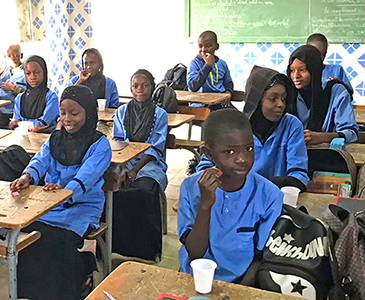
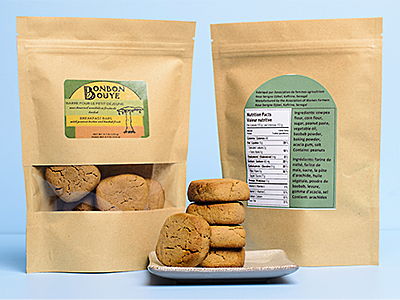
1st photo: On their 2020 trip to Senegal, Edwin and Dr. Kuo conducted preliminary product sensory tests with school-age children and the community. 2nd photo: Bonbon Bouye, courtesy of Rebecca Soulé, Instagram.com/rebeccasoule
U.S. nutriton bar
In 2022-2023, PATH investigated the potential for commercialization of a Bonbon Bouye-inspired nutrition bar in the United States. The product was tailored to Montanan's needs and palates by FPDL Chef Rebecca Soulé and other team members to incorporate local ingredients and make the bar shelf-stable, nutritious, and flavorful. Team PATH partnered with Mission Mountain Food Enterprise Center based out of Ronan, Montana to explore processing the product and with Montana Co-op based out of Hot Springs, Montana to discuss selling the product.
This work was supported by a Montana State University Technology Transfer Office CATalyst Gap Fund award, with funding from U.S. Economic Development Administration (USEDA) award ED19HDQ0200091. The content of this web page is solely the responsibility of the authors and does not necessarily represent the official views of MSU or the USEDA.
Ndangane food production factory
In Fall 2021-Spring 2022, a group of MSU chemical engineering students worked with team PATH for their capstone project. The objective of the project was to design a facility for the smallholder women farmers in Ndangane to make their products. The proposed facility would house all the equipment needed to produce Bonbon Bouye including a mixer, convection oven, and grinder to make flour. The chemical engineering team took a human-centered design approach to address the future factory workers' needs by including a prayer room, a play area for children, a classroom and office space, and a community garden.
The PATH team composed a presentation to introduce the program and the proposed factory design to the African Development Bank (AfDB), which was planning to fund the construction of numerous food production facilities in Senegal. Program Coordinator, Aliou Ndiaye, met with AfDB in December of 2021 to deliver the presentation and make a case for selecting Ndangane as a factory site. In spring 2022, AfDB agreed to build at Ndangane and considered incorporating aspects of the proposed design, provided materials were available and affordable. Construction commenced in January 2023, aligning with the PATH team's third visit to Ndangane.
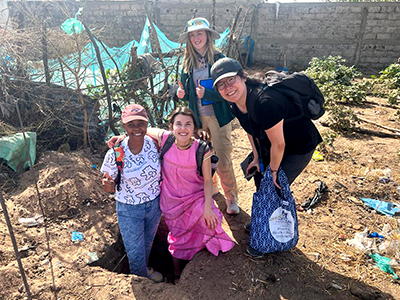
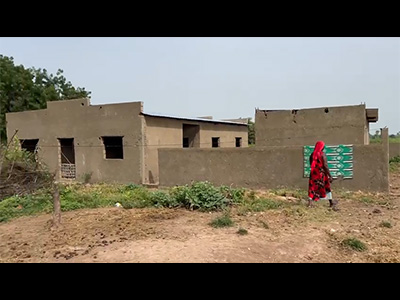
1st photo, pictured from left to right: grad student Chidimma Ifeh, undergraduate researchers Olivia Schwintek and Hannah Kempf, and Dr. Wan-Yuan Kuo pose at the groundbreaking of factory construction in Ndangane. 2nd photo: Factory walls and roof are complete as of October, 2023.
Fermentation research
In 2022, student researchers continued their collaboration with Ndangane women farmers in developing a nutritious fermented drink. In Senegal, yogurt is the most commonly-available fermented food. Team PATH's creation incorporates milk along with locally-sourced grain (sorghum) and fruit, aiming for a culturally-acceptable product that mitigates postharvest losses of these crops. Fermenting milk with sorghum via the introduction of lactic acid bacteria unlocks the iron potential in sorghum. The incorporation of the Indigenous baobab tree fruit, a rich source of vitamin C, enhances iron absorption, resulting in a promising solution to combat iron deficiency in Senegal. Different starter cultures and flavor variations are currently being tested.
The fermentation research is funded by the Foundation for Food & Agriculture Research New Innovator Award (FF-NIA21-0000000070). The content of this web page is solely the responsibility of the authors and does not necessarily represent the official views of the Foundation for Food & Agriculture Research (FFAR).
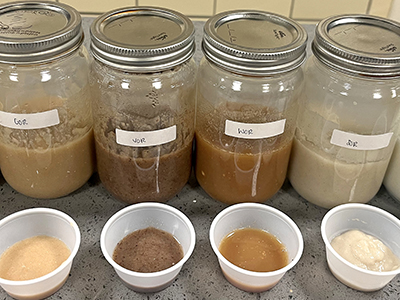
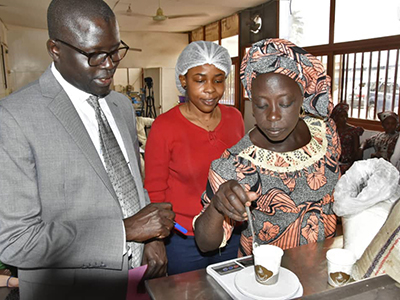
1st photo: 2023 fermented beverage trials at the MSU Food Product Development Lab. 2nd photo: Chidimma Ifeh (center) conducts a fermentation training for the women farmers at the Kaolack Chamber of Commerce (serving entrepreneurs in the Kaffrine region) with coordination and language translation provided by Aliou Ndiaye (left).
Learn more
PATH fundraising video
Podcast interview
2023
In episode 72 of the BAKED in Science podcast, host Mark Floerke interviews four PATH food science researchers (Dr. Wan-Yuan Kuo [FPDL and PATH director], Edwin Allan [MSU PhD student], and Chidimma Ifeh [MSU master's student]) about their work with Senegalese women smallholder farmers to develop Bonbon Bouye—a nutrition bar made of Senegalese Indigenous plants and locally-grown crops—and a yogurt drink containing fermented grains and fruit.
Peer-reviewed publications
- Allan E, Ndiaye A, Song M, Raber E, Kuo W. 2022. Developing a culturally acceptable peanut nutrition bar with smallholder women farmers in Kaffrine, Senegal using response surface methodology, Journal of Food Science. https://doi.org/10.1111/1750-3841.16412
- Allan E, Dunkel F, Lachapelle P, Kim S, Kinnare C, Ndiaye A, Kuo W. 2022. Developing culturally acceptable peanut nutrition bars with smallholder women farmers in Kaffrine, Senegal using participatory action research, Local Development & Society. https://doi.org/10.1080/26883597.2022.2115939
Scientific posters
2023
- Schwintek O, Ifeh C, Kempf H, Kim S, Kuo W. Value in the eyes of farmers and researchers - a case study on Indigenous fruit fermentation and entrepreneurship. Institute of Food Technologists Annual Event & Expo, July 2023, Chicago, Illinois. View poster PDF and ADA accessible HTML.
Competitions
3-Minute Thesis competition
2023
- "Baobab Yogurt! A Nutritious blend of Western Technology and Indigenous Knowledge" - Master's student, Chidimma Ifeh, placed 1st in both the university- and college-wide competitions. Competition recording (video)
Institute of Food Technologists (IFT) Developing Solutions for Developing Countries Product Development Competition
2023
Frutta-Sorgho! – An Instantly Nutritious Blend of Indigenous Knowledge and Western Technology Co-Developed with Senegal Women Farmers
- PDF slide presentation
- Frutta-Sorgho! promotional video:
2020
- Bonbon Bouye: a Culturally Acceptable Peanut Nutrition Bar Developed with Senegalese Smallholder Women Farmers: Competition recording (video)
Class presentations
2021-2022
ECHM 412R presentation on Bonbon Bouye development and Senegal manufacturing facility plans
News articles
2020
- Cookin' the Competition
- Resourceful Students Shift to Virtual Product Competitions
- Bonbon Bouye Peanut Nutrition Bar: A Step Forward for Smallholder Women Farmers in Senegal
* Current PATH members include Aliou Ndiaye, Program Coordinator (Umbrella Support Unit, Senegal); Wan-Yuan Kuo, FPDL Director; Mary Miles, Professor and Associate Dean of Research for the College of Health & Human Development; Graham Austin and Trevor Huffmaster, Professors, Jake Jabs College of Business & Entrepreneurship; Paul Gannon, Professor, Chemical & Biological Engineering; Bruce Barnhart, Assistant Teaching Professor, School of Art; staff members Rebecca Richter and Rebecca Soulé; MSU graduate student, Chidimma Ifeh; undergraduates Katie Elliott, Shelby Smith, Lynn Weeks; Mark Floerke, Baked In Science Podcast Host at BAKERpedia; and Donna Rosa, Chief Entrepreneurship Officer at EFour Enterprises LLC.


